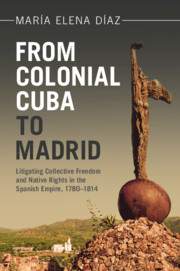 From Colonial Cuba to Madrid
From Colonial Cuba to Madrid Book contents
- From Colonial Cuba to Madrid
- Afro-Latin America
- From Colonial Cuba to Madrid
- Copyright page
- Contents
- Figures and Tables
- Acknowledgments
- Introduction
- 1 Imperial Reform, Privatization, and Enslavement
- 2 An Unorthodox Pueblo and Its Apoderados
- 3 Making the Case for Collective Freedom
- 4 Native Bonds, Native Rights
- 5 The Council’s Ruling and the Politics of Litigation
- 6 A “Pernicious” Communication
- 7 Violence, Marronage, and Litigation
- 8 The Final Outcome of the Case
- 9 The Nineteenth-Century Afterlife of the Freedom Edict of 1800
- Conclusion
- References
- Index
2 - An Unorthodox Pueblo and Its Apoderados
Published online by Cambridge University Press: 14 November 2024
- From Colonial Cuba to Madrid
- Afro-Latin America
- From Colonial Cuba to Madrid
- Copyright page
- Contents
- Figures and Tables
- Acknowledgments
- Introduction
- 1 Imperial Reform, Privatization, and Enslavement
- 2 An Unorthodox Pueblo and Its Apoderados
- 3 Making the Case for Collective Freedom
- 4 Native Bonds, Native Rights
- 5 The Council’s Ruling and the Politics of Litigation
- 6 A “Pernicious” Communication
- 7 Violence, Marronage, and Litigation
- 8 The Final Outcome of the Case
- 9 The Nineteenth-Century Afterlife of the Freedom Edict of 1800
- Conclusion
- References
- Index
Summary
Chapter 2 examines the local context of the pueblo of El Cobre and its members’ response to the privatization of the mining estate and their ensuing enslavement. It probes the unorthodox character of this community and the villagers’ vernacular collective self-identification as “cobreros,” or natives of El Cobre, an identification that they pressed on the court to counter their captivity and make other claims. The bonds of pueblo towered over and above possible internal cleavages along formal free or slave status, class, race, and gender. The cobreros’ collective action was possible precisely because of their social bonds and (informal) organization as a pueblo. The community empowered Gregorio Cosme Osorio, one of their own, to be their apoderado or legal representative in the royal court in Madrid, a rare liaison position for a colonial racialized man and another extraordinary aspect of the case. The chapter then turns trans-local as it traces Cosme’s journey and the networks he created from El Cobre to Madrid to litigate collective freedom. The chapter also examines the financial, administrative, political, and social challenges that these colonial litigants faced in accessing the judicial arena, particularly at the imperial level.
- Type
- Chapter
- Information
- From Colonial Cuba to MadridLitigating Collective Freedom and Native Rights in the Spanish Empire, 1780–1814, pp. 63 - 104Publisher: Cambridge University PressPrint publication year: 2024
